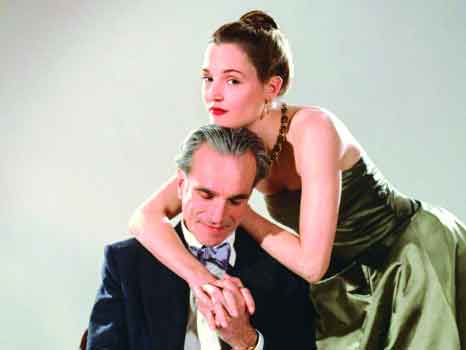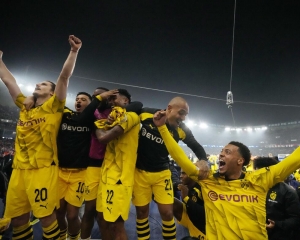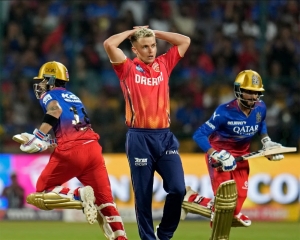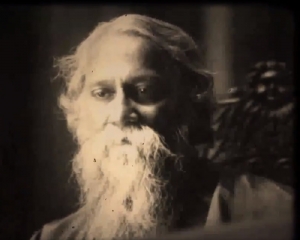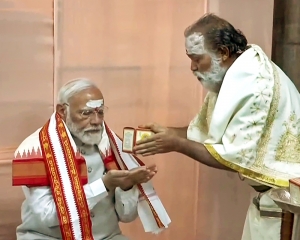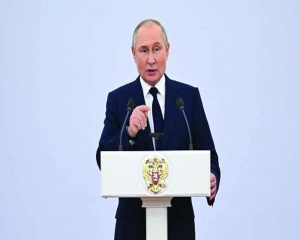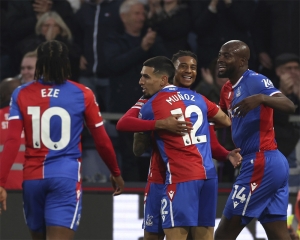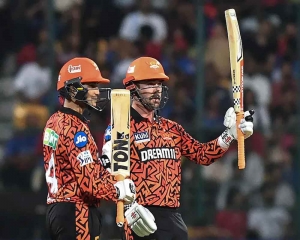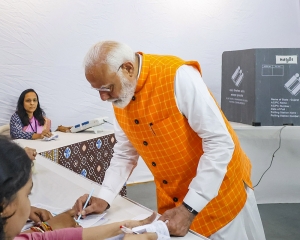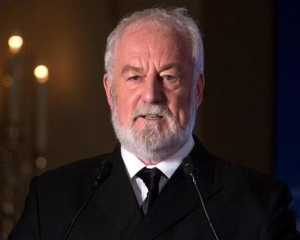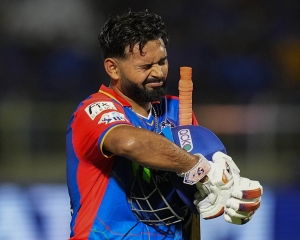Actor Vicky Krieps fashioned her character of a strong woman on her grandmother in Phantom Thread. By Team Viva
Is it true that you didn’t have much contact with Daniel Day-Lewis before filming Phantom Thread?
We met for the first time in London at the Covent Garden Hotel when we read the script. Post that, I never met him. I was told that he preferred not to rehearse. Then I met him on the set.
He famously prepares for a role for a long time before the filming starts. Was it intimidating when you met him almost for the first time when you were on set?
It was intimidating for me. But I knew I had no alternative. Someone proposes a job offer and you say ‘OK, how can I work with this?’ So I just accepted it. Also when we met in London, reading of the script was so obvious. It felt so natural and in a way, as if this story had to be told by us. This might sound weird. So I then tried to trace the memory of that moment and I knew it was going to be fine.
Was there a parallel between the story about Reynolds and Alma, and you as an actress working with a successful established actor like Daniel?
Yes. I think this is why I accepted it since I thought it would fit the story and while playing Alma, I thought it would suit her to not know about the things that are going on around her. I dived more and more into what I had — nothing. I tried to be like a white empty canvas.
Did you watch Anderson’s previous films to prepare?
I didn’t. When I knew I would be working with Paul and Daniel, I decided not to watch their movies and to not find out about method acting.
Are they very different people in and out of character?
Not really. I spoke to him about it and this method acting to me is a word, an approach. It’s how you work to get to the place that everyone wants to reach, where you can be so free that you can be open to what is happening on set.
But were you excited to work with Daniel?
Well, that’s exactly the point. I was not excited because I tried not to be excited. I tried not to think about that I was working with Daniel Day-Lewis, a method actor. If I had been looking for signs of ‘is this him or is this the character,’ I think it would have taken away from my performance. As an actor, what you want to be is completely honest and pure so you don’t want to think about ‘I’m now in a movie with this guy and is he method or not?’
The film is about a strong woman, Alma, fighting to save her relationship with Reynolds. What does it mean to you to be a strong woman?
Many things. But related to Alma, I would say she is a strong woman because she doesn’t need approval from men, women or anyone else. She is who she is. It’s only when you want approval to be liked in the eyes of someone that you become weak, especially women. If you open yourself to the judgement of men, wanting to be beautiful or sexy, this is when you put yourself in a weak position. And Alma doesn’t give in. For me, I’m still trying to understand her. But she’s between a man and a woman; old and young; and now and the 50s. I think that makes her very strong and it is something that women have had over the years.
When I prepared Alma, I knew I had to give her a strong back because I wanted her to be this white canvas but behind that had to be a lot of earth. So I thought of my grandmothers — who are no longer with us — this is where I found my answers. These women, from that generation, had to be incredibly strong because there was no other way. If you went through the war, you wouldn’t have asked yourself, “Am I comfortable? Do I get the attention I need?” You get up, get your day done and do what you can. Alma has left her country and come to a new one, England, and she had to go and work in the teashop.
What was your experience of working with Daniel? Any anecdotes to share?
I’ve been asked that a few times. And recently, we were doing some TV interviews together — Daniel was sitting next to me — I realised that the way he was there, talking, reminded me of how he was when he was in character and it was fascinating. When you are an actor, you do it because you are so intrigued by life, you are curious, and it’s this curiosity that drives you. When I’m with Daniel, I could sit there for hours and just listen and watch him as everything about him is so detailed. He knew exactly how this man, Reynolds, would behave. I could watch him talk and stand and I could detect the body language of his character — and of course, I tried to do that with my character as well — but when someone is such a perfectionist, you can watch it. It’s like art. I loved listening to him as Reynolds when he was talking about the 1950s, which Daniel as a child would have known, and he would tell me about Virginia Woolf and England. He could talk about it for hours and I would just sit and listen (laughs).
One of the many memorable scenes in the film is when your character finally tells Reynolds what she thinks of him…
Do you mean the dinner scene where Alma tells him her opinion? Well, that’s an example of how Alma and I, both our experiences, are so close and what Paul was probably searching for. When I read the script, I thought this was what the story would need — this person who doesn’t know and is finding out things. And the end of that scene is improvised and whatever I say as Alma’s opinion of Reynolds came to me in that moment. I didn’t know I was going to say that. All I knew was that I had the lines for that scene and they were so beautifully written — and Daniel said the same — that it felt like being on a slide. So you had this beautiful text and you would go on the slide because it was so strong. But it didn’t have an ending. And Paul said to me that because there was no ending, he was hoping that something would happen — that Alma just told him what she thinks. And I remember afterwards thinking, “was that OK or wrong? Was I allowed to do this?” (Laughs)
You appeared in the German crime series Tatort. Was that a school for you as an actor?
I actually only did one episode of Tatort. Was that a good school? I think a good school was when I worked on Joe Wright’s Hanna. I had a small role but I was working with Cate Blanchett. I also did Anonymous with Vanessa Redgrave and I used that really like a school. I was observing the whole day and learning how things work. I remember thinking back then “this feels easy like breathing and it feels like home.” But then my brain was going “no, it can’t be, this is a big set and you are supposed to be intimidated.” It was quite hard after making those films to go back and do Tatort and things like that knowing that actually you can do things differently. I remember the wigs in Hanna were perfect — they were made by this English guy and he’s a genius. And on the job I was doing afterwards I could see how bad the wigs were and I couldn’t tell myself to not see it, so it was a blessing and a curse (laughs).
When did you know that you wanted to do acting?
Because I grew up in Luxembourg, I wouldn’t dare to have the idea that this was what I wanted. It was too crazy and unreachable.
Paul Thomas Anderson said that he saw you in a film where you are a cleaner…
Yes, The Chambermaid.
Did he tell you what it was about your performance in that film that convinced him to cast you?
Well, first of all, I was very lucky that he watched it because the film was on iTunes and he could have missed it. He liked it. I don’t know if he saw something in me. In Phantom Thread, the uniform I wear is quite similar to the one in The Chambermaid. Maybe that was on his mind and I don’t talk much, maybe he thought “oh that’s good too.”
Is there something unique about the way he directs?
Well, he’s mad and that’s great (laughs). Someone who is mad and ready enough to have a woman poisoning a man because they love each other. So he’s mad enough to invent these stories. That’s the basis of everything and that means he is open and free in his mind. As an actor, if you work with someone like this, it’s great because you can blossom in every possible way. And to me what was striking was that he is always respectful of the actors. He comes to you and says, “What do you think Alma would do?” And that can be intimidating but if you get rid of your fear, it’s actually great because you can start to be free and not think about your performance of the scene or what you want to achieve.
Does he do many takes?
If he needs them, yes. He’s both. Like with me, he didn’t do many takes and at one point he said to me, “Vicky you know I like what you are doing, right?” And I was like, “Well, actually no, because you haven’t said anything.” And he said, “Well, you should know that if I don’t like it, I’ll do it 10 times, so if I don’t say anything, that’s a good sign.” But if he needs to, he does many takes.
Phantom Thread is an Oscar-nominated film. Has being in the film opened doors for you?
I have no answer to it because currently my life has not changed in any way. I hope it doesn’t. I hope I meet more spirits like Paul with whom I can share my vision.
(The film premieres on March 24 at 1 pm on Sony PIX.)













